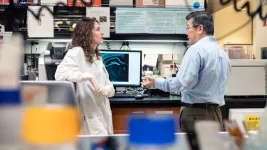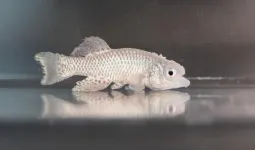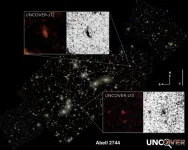(Press-News.org) San Francisco—November 13, 2023—Researchers at Gladstone Institutes have discovered that a rare genetic variant known as the “Christchurch mutation” can block detrimental effects of apolipoprotein E4, the best-established risk factor for the most common form of Alzheimer’s disease.
The apolipoprotein E (APOE) gene has long been known to affect the risk of Alzheimer’s disease through its three main variants: E2 (low risk), E3 (intermediate risk), and E4 (high risk). More recently, a genetic change in this gene, the “Christchurch mutation,” was identified in a woman who did not develop Alzheimer’s disease, even though she had inherited another gene that causes a very rare but highly aggressive form of the disease, raising the possibility that the Christchurch mutation may protect against Alzheimer’s disease.
Now, researchers at Gladstone Institutes investigated whether the Christchurch mutation can also protect against the detrimental effects of APOE4, which is an important risk factor for the most common form of Alzheimer’s disease. The scientists found that engineering the Christchurch mutation into the APOE4 gene reduces the APOE4-dependent accumulation of the protein tau, neuroinflammation, and neurodegeneration in models of Alzheimer’s disease.
“It’s really exciting that the Christchurch mutation can lead to such broad protection,” says Gladstone Investigator Yadong Huang, MD, PhD, senior author of the new study published in Nature Neuroscience. “It opens the door to novel therapeutic interventions that could mimic the beneficial effects of this mutation.”
Complex Genetics
In 2019, researchers learned about the woman near Medellin, Colombia, who escaped her family’s fate of early-onset Alzheimer’s disease. She and many of her extended family carried a variant of the PSEN1 gene that causes a rare but very aggressive form of early-onset Alzheimer’s. She, however, also carried another mutation—a tiny change in the APOE gene known as the Christchurch mutation. The same mutation had been identified decades earlier in a family in Christchurch, New Zealand, and was shown to have an impact on cholesterol levels and heart disease.
“It seemed likely that this woman was protected from early-onset Alzheimer’s disease because of the APOE Christchurch mutation,” says Huang, who is also director of the Center for Translational Advancement at Gladstone, and professor of neurology and pathology at UC San Francisco. “We immediately wondered whether this mutation could also be protective against late-onset Alzheimer’s, which accounts for the vast majority of cases of the disease.”
Huang’s lab had already been studying the impact of APOE4 on brain cells and had developed strains of mice, whose own APOE genes were replaced with human APOE genes, and that also produce the human tau protein, which accumulates in the brain with aging and in Alzheimer’s disease.
Maxine Nelson, PhD, a former graduate student in Huang’s lab and lead author of the new paper, and her collaborators further engineered those strains of mice to also have the Christchurch mutation. They also used CRISPR gene editing to alter the APOE4 gene in human induced pluripotent stem cells, which had been generated from an Alzheimer’s disease patient’s blood cells, and then developed into mature neurons in a dish.
“It was amazing to be able to bring all these technologies together to answer a question that had significant implications for both research and patients,” says Nelson.
Broad Protection
In mice that carried human APOE4 and tau genes but lacked the Christchurch mutation, the researchers saw many of the expected signs of Alzheimer’s disease. The tau protein accumulated in neurons, levels of neuroinflammation increased in the brain, and immune cells known as disease-associated microglia became more prevalent.
Remarkably, introducing the Christchurch mutation into these mouse models prevented or markedly reduced these abnormalities.
By comparing human neurons that produced APOE4 with or without the Christchurch mutation in cell culture, the researchers were able to identify molecular mechanisms that could contribute to the beneficial effects of the mutation in brain. These mechanisms relate to the transfer of tau from the outside to the inside of neurons, which might contribute to neuronal impairments in Alzheimer’s disease. This transfer, or uptake, of tau is mediated by cell surface molecules called heparan sulfate proteoglycans (HSPGs) and, as it turns out, is strongly affected by APOE and the Christchurch mutation.
That APOE interacts with HSPGs was demonstrated 30 years ago by Gladstone Investigator Robert Mahley, MD, PhD, who is also a co-author of the recently published study.
In the new study, the scientists found that the Christchurch mutation strongly reduces the ability of APOE4 to bind HSPGs and that this effect leads to a marked reduction in neuronal tau uptake.
“The results suggest that blocking the interaction of APOE4 with HSPGs could help treat or prevent Alzheimer’s disease in people with the APOE4 gene,” Huang says. “This might be accomplished with small molecule drugs, monoclonal antibodies, or gene therapy. However, more work is needed before such treatments can be developed and tested.”
About the Study
The paper, “The APOE-R136S mutation protects against APOE4-driven Tau pathology, neurodegeneration and neuroinflammation,” was published in the journal Nature Neuroscience on November 13, 2023. Other authors are: Peng Liu, Ayushi Agrawal, Oscar Yip, Jessica Blumenfeld, Michela Traglia, Min Joo Kim, Nicole Koutsodendris, Antara Rao, Brian Grone, Yanxia Hao, Seo Yeon Yoon, Qin Xu, Samuel De Leon, Tenzing Choenyi, and Reuben Thomas of Gladstone; Francisco Lopera of Universidad de Antioquia; Yakeel Quiroz of Massachusetts General Hospital; Joseph Arboleda-Velasquez of Harvard Medical School; and Eric Reiman of University of Arizona.
The work was supported by the National Institutes of Health (R01AG071697, RF1AG076647, P01AG073082, 1RF1AG059751, F31AG074690, F31AG074672, P3 AG072980), Open Philanthropy, and Good Ventures.
About Gladstone Institutes
Gladstone Institutes is an independent, nonprofit life science research organization that uses visionary science and technology to overcome disease. Established in 1979, it is located in the epicenter of biomedical and technological innovation, in the Mission Bay neighborhood of San Francisco. Gladstone has created a research model that disrupts how science is done, funds big ideas, and attracts the brightest minds.
END
How good can overpower evil in the genetic determination of Alzheimer’s disease
New research sheds light on protective mechanisms of the “Christchurch mutation”
2023-11-13
ELSE PRESS RELEASES FROM THIS DATE:
Recreation of ancient seawater reveals which nutrients shaped the evolution of early life
2023-11-13
Scientists know very little about conditions in the ocean when life first evolved, but new research published in Nature Geoscience has revealed how geological processes controlled which nutrients were available to fuel their development.
All life uses nutrients such as zinc and copper to form proteins. The oldest lifeforms evolved in the Archean Eon, three and a half billion years before the dinosaurs first appeared. These microbes showed a preference for metals such as molybdenum and manganese compared to their more recent counterparts. This ...
Cycle of fasting and feeding is crucial for healthy ageing
2023-11-13
Fasting interventions, which involve alternating periods of fasting and refeeding, are generally thought to improve health. But these interventions don’t work as well in old animals. The question is: Why? By studying the short-lived killifish, researchers at the Max Planck Institute for Biology of Ageing in Cologne have shown that older fish deviate from a youthful fasting and refeeding cycle, and instead enter a state of perpetual fasting, even when ingesting food. However, the benefits of refeeding after fasting in old killifish can be restored by genetically activating a specific subunit of AMP kinase, an important sensor ...
How climate change could be affecting your brain
2023-11-13
A new element of the catastrophic impacts of climate change is emerging – how global warming is impacting the human brain.
In a paper published today in Nature Climate Change, an international team of academics explore the ways in which research has shown that a changing environment affects how our brains work, and how climate change could impact our brain function in the future. The paper is led by the University of Vienna with input from the universities of Geneva, New York, Chicago, Washington, Stanford, Exeter in the UK and the Max Plank Institute in Berlin. It also explores the role that neuroscientists can play in further understanding and addressing ...
Reducing systolic blood pressure to less than 120 mm Hg reduced cardiovascular event risk
2023-11-13
Research Highlights:
In a 3-year trial, intensive treatment with antihypertensive medication to reduce systolic blood pressure, the top number, to less than 120 mm Hg reduced cardiovascular disease events among people at high-risk for cardiovascular disease by 12% compared to standard treatment with a target of less than 140 mm Hg.
The effects were consistent regardless of participants’ diabetes status (Type 1, Type 2 or none) or history of stroke.
Embargoed until 8 a.m. ET, Monday, Nov. 13, 2023
PHILADELPHIA, ...
Ovarian cancer: Artificial intelligence predicts therapy responses
2023-11-13
A model based on artificial intelligence is able to predict the therapy outcome (measured by volumetric reduction of tumor lesions) in 80% of ovarian cancer patients. The AI-based model has an accuracy of 80%, significantly better than current clinical methods. The tool, named IRON (Integrated Radiogenomics for Ovarian Neoadjuvant therapy), analyzes various patient clinical features, from circulating tumor DNA in the blood (liquid biopsy) to general characteristics (age, health status, etc.), tumor markers, and disease images obtained through CT scans. ...
American Heart Association honors Gladstone President Deepak Srivastava with Distinguished Scientist Award
2023-11-13
Deepak Srivastava, MD, president of Gladstone Institutes and a renowned cardiovascular researcher, took the stage on Saturday in Philadelphia to receive the American Heart Association’s Distinguished Scientist award—joining a preeminent group of scientists and clinicians who’ve earned the association’s highest honor over the past decade.
The American Heart Association applauded Srivastava for his significant, original, and sustained scientific contributions that have advanced the association’s mission: “To be a relentless ...
Second-most distant galaxy discovered using James Webb Space Telescope
2023-11-13
The second- and fourth-most distant galaxies ever observed have been discovered in a region of space known as Pandora’s Cluster, or Abell 2744, using data from NASA’s James Webb Space Telescope (JWST). Following up on a deep field image of the area, an international team led by Penn State researchers confirmed the distance of these ancient galaxies and inferred their properties using new spectroscopic data — information about light emitted across the electromagnetic spectrum — from JWST. At nearly 33 billion light years away, these incredibly distant ...
Researchers explore origins of lupus, find reason for condition’s prevalence among women
2023-11-13
For years, researchers and clinicians have known that lupus, an autoimmune condition, occurs in women at a rate nine times higher than in men. Some of the factors that cause the disease’s high prevalence in women have eluded discovery, but in a new study investigating the immune system processes in lupus and the X chromosome, Johns Hopkins Medicine researchers have uncovered answers about the disease’s frequency in females.
A number of dysregulated genetic and biological pathways contribute to the development of lupus and its varied symptoms of muscle and joint pain, ...
Capture or reuse CO2 as a chemical source for the production of sustainable plastics
2023-11-13
A scientific team has developed a new polyurethane production technique using CO2 to create new types of easily recyclable plastics. The study, published in the Journal of the American Chemistry Society (J.A.C.S.), could provide a solution for the development of truly sustainable plastics.
Commodity plastics have transformed global industry. Whether in construction, clothing, vehicles or food packaging, these plastics are everywhere in our daily lives, so much so that their global use has been estimated at around 460 million tons in 2019. This number is staggering, but not surprising, because plastics, also known as synthetic polymers, have met a large ...
Self-deception may seed ‘hubris balancing,’ leading to Putin’s war against Ukraine
2023-11-13
Strategy underlies the affairs of national leaders, including how they view and interact with other states — but what if such strategy is borne of self-deception? That’s the thrust of a novel international relations theory that Ryuta Ito of Hiroshima University has now expanded upon, providing psychological rationalization to explain the irrational acts of national leaders at war.
Ito penned his reasoning on Sept. 5 in the journal International Affairs.
“Why did Vladimir Putin decide to invade Ukraine in 2022?” asked Ito, assistant professor in the Graduate School of Humanities and Social Sciences at Hiroshima University. ...
LAST 30 PRESS RELEASES:
Women may face heart attack risk with a lower plaque level than men
Proximity to nuclear power plants associated with increased cancer mortality
Women’s risk of major cardiac events emerges at lower coronary plaque burden compared to men
Peatland lakes in the Congo Basin release carbon that is thousands of years old
Breadcrumbs lead to fossil free production of everyday goods
New computation method for climate extremes: Researchers at the University of Graz reveal tenfold increase of heat over Europe
Does mental health affect mortality risk in adults with cancer?
EANM launches new award to accelerate alpha radioligand therapy research
Globe-trotting ancient ‘sea-salamander’ fossils rediscovered from Australia’s dawn of the Age of Dinosaurs
Roadmap for Europe’s biodiversity monitoring system
Novel camel antimicrobial peptides show promise against drug-resistant bacteria
Scientists discover why we know when to stop scratching an itch
A hidden reason inner ear cells die – and what it means for preventing hearing loss
Researchers discover how tuberculosis bacteria use a “stealth” mechanism to evade the immune system
New microscopy technique lets scientists see cells in unprecedented detail and color
Sometimes less is more: Scientists rethink how to pack medicine into tiny delivery capsules
Scientists build low-cost microscope to study living cells in zero gravity
The Biophysical Journal names Denis V. Titov the 2025 Paper of the Year-Early Career Investigator awardee
Scientists show how your body senses cold—and why menthol feels cool
Scientists deliver new molecule for getting DNA into cells
Study reveals insights about brain regions linked to OCD, informing potential treatments
Does ocean saltiness influence El Niño?
2026 Young Investigators: ONR celebrates new talent tackling warfighter challenges
Genetics help explain who gets the ‘telltale tingle’ from music, art and literature
Many Americans misunderstand medical aid in dying laws
Researchers publish landmark infectious disease study in ‘Science’
New NSF award supports innovative role-playing game approach to strengthening research security in academia
Kumar named to ACMA Emerging Leaders Program for 2026
AI language models could transform aquatic environmental risk assessment
New isotope tools reveal hidden pathways reshaping the global nitrogen cycle
[Press-News.org] How good can overpower evil in the genetic determination of Alzheimer’s diseaseNew research sheds light on protective mechanisms of the “Christchurch mutation”






